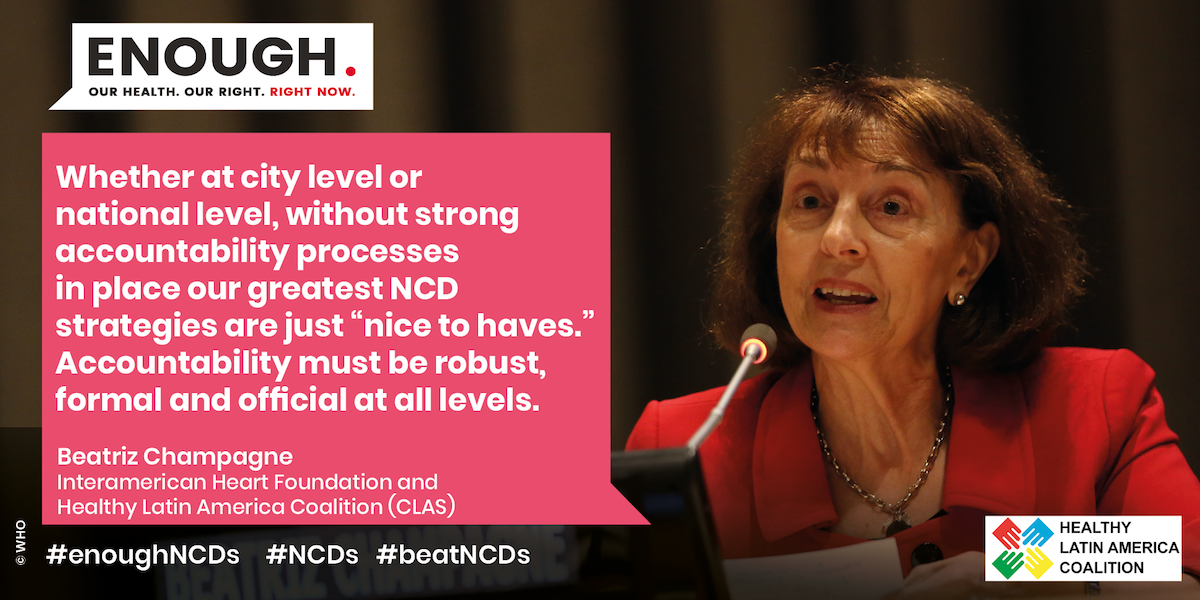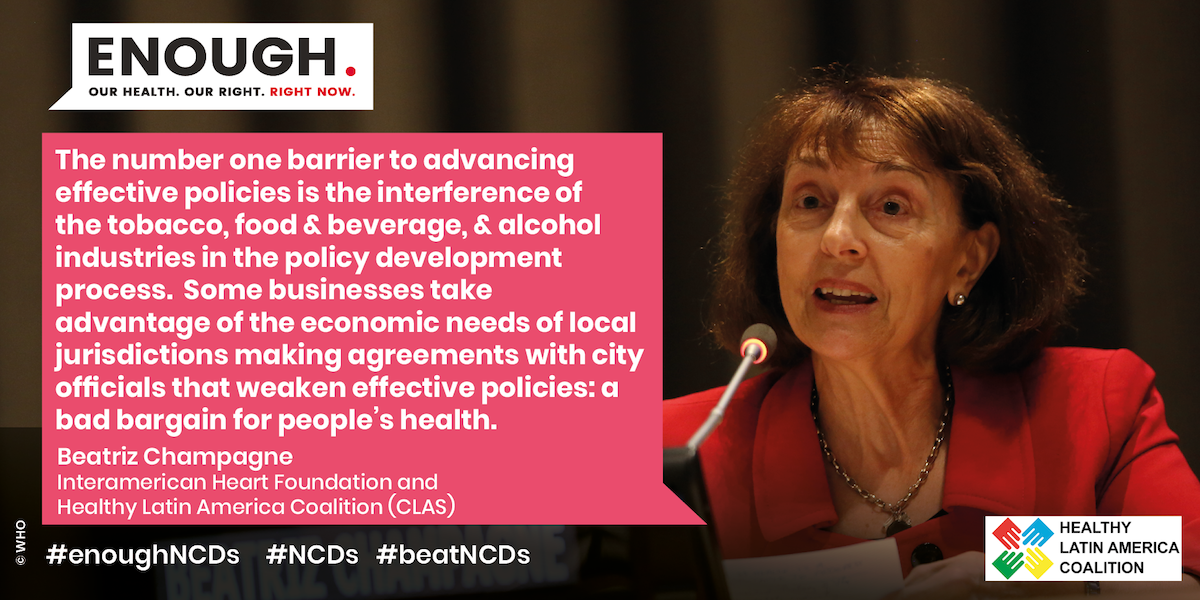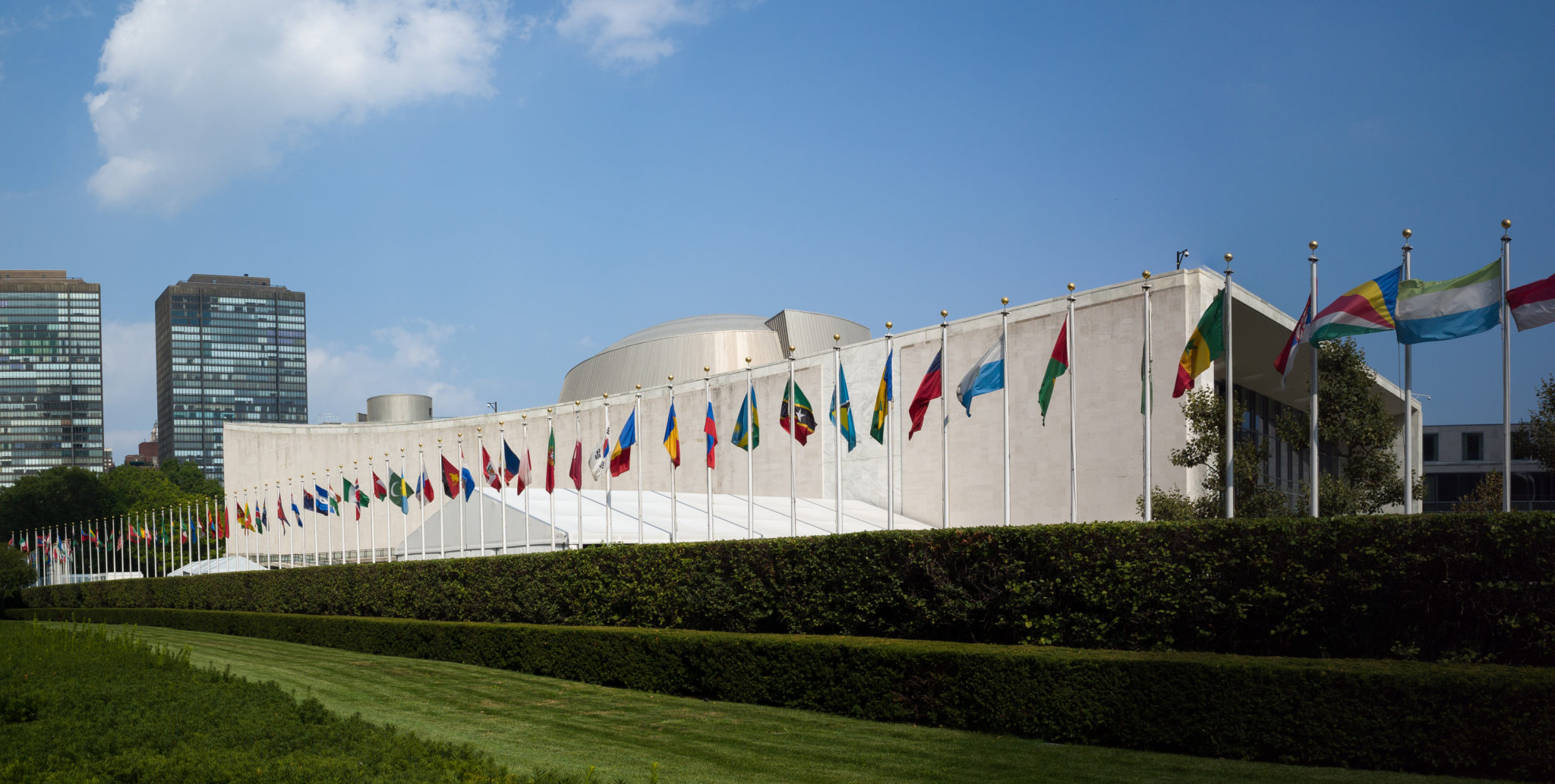
Political leadership and accountability: Beatriz Marcet Champagne, CLAS, delivers powerful message at UN interactive hearing
This speech was delivered by Beatriz Marcet Champagne, coordinator of CLAS and Director of InterAmerican Heart Foundation, United States, during the UN Interactive Hearing held on 5 July 2018. The topic of her panel speech was “Political leadership and accountability”
5 July, New York
I am part of the Interamerican Heart Foundation and lead the Healthy Latin America Coalition, an alliance of about 300 organizations in Latin America whose objective is to strengthen civil society to prevent and control NCDs in our region.
I was asked to consider the role that mayors and their cities play in advancing NCD prevention and control and how to encourage their support and participation.
In the world there are about 4,400 cities with populations over 150k and 31 megacities with more than 10 million pop. And we are becoming even more urban.
I want to make 3 points: role of mayors, interference of the industry and accountability
Point 1: mayors have a significant role to play and are part of the whole-of-government and whole of society approach.
They can advance many of the Best Buys and other interventions identified by WHO as effective to reduce NCDs, and that are already agreed by member states. Mayors are key actors that are able to act and lead when national governments can’t, won’t or haven’t yet. They can also amplify the effect locally when national governments have acted.
Mayors have and have had very significant roles in prevention and control of NCDs. Imagine where we would be if mayor Michael Bloomberg, former mayor of this great city of New York, would not have taken on tobacco control and obesity prevention. He has taken his efforts as a mayor from the municipal level to the world stage.
But not all mayors have the opportunities and personal resources of Mayor Bloomberg. Yet they have taken the leadership as well. Ex:
A. Cities like Mexico, Sao Paulo and Buenos Aires had mayors that supported smokefree environments—an action that helped lead their countries to expanding SFEs.
B. Many cities are part of networks such as who healthy cities initiative to advance various strategies at the city level; another is partners for healthy cities working with 50 cities around the world.
C. Many cities have their own healthcare services. In brazil they involve thousands of people. Mayors have the responsibility for efficient administration of funds for these services. NCD prevention strategies are crucial for efficient administration and to optimize financial resources.
Lessons: cities provide space for innovation and are closer to people. They can more easily take the lead.
How to encourage greater involvement of mayors? Some possibilities:
Recognition of champion mayors. Peer to peer dialogue. Establishing city level urban health commissions – including people living with NCDs.
Helping cities win even modestly to reduce air contamination, expand green spaces, improved security, get healthier foods and water fountains in schools, smokefree enclosed spaces, greater access to equitable healthcare … successes such as these encourage greater involvement of mayors in the NCD movement.
Point 2: interference from the unhealthy products industries hits cities too
The number one barrier to advancing effective policies is the interference of the tobacco, food & beverage, and alcohol industries in the policy development process. Some businesses take advantage of the economic needs of local jurisdictions making agreements with city officials that weaken effective policies: a bad bargain for people’s health.
There is a well-documented history of the unhealthy commodities industry infiltrating public health organizations, subverting science, and interfering and undermining public policies that promote health. The high level commission report seeks a “fresh relationship” with the private sector. We agree. But there is a poor track record of voluntary commitments.
Same principles that regulate tobacco relationships in the FCTC can be used with other unhealthy commodities, when commercial interest are at odds with public health. We call on governments to learn from past experiences and adopt effective regulatory measures, establish strict engagement principles that manage COI, ensure transparency…no involvement in policy development…yes, in policy implementation.
It is understandable that with billion dollar brands these industries will mount a fight against threats to their products. However, in the balance is the health of millions of people, the economic sustainability of countries, the wellbeing of new generations of humans that might not know what is real food, or might not be able to just go out to play, might think nicotine addiction is cool.
Point 3: accountability at all levels
Whether at the city level or the national level, without strong accountability processes in place our greatest NCD strategies are just “nice to haves.” Accountability must be robust, formal and official at all levels.
We need to take a lesson from many existing international treaties that have robust accountability measures that provide for monitoring, feedback and recommendations. They also provide formal and official space for civil society to take a part.
We can introduce independent accountability where peers visit a jurisdiction and help evaluate progress and recommend actions to improve the NCD response.
To conclude:
City mayors are key actors and there are many ways to involve them in the NCDs movement. Mayors and municipal governments are also affected by strong interference by industry in policy development. Accountability must be robust, formal and official at all levels, including municipal levels. Thank you.





